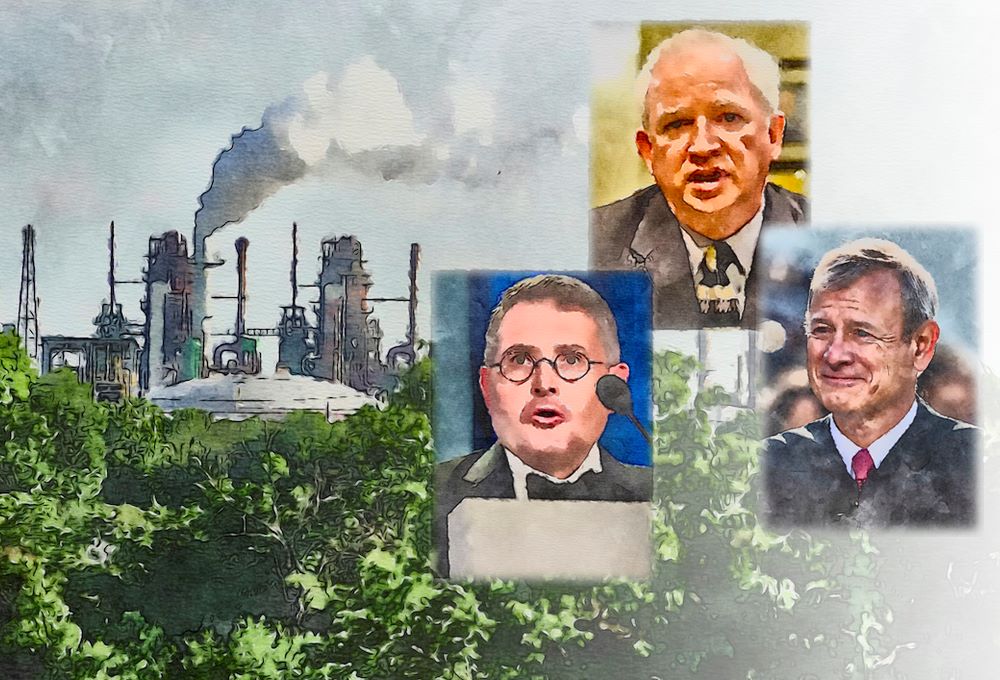
(NCR illustration/Toni-Ann Ortiz; John Eastman: Wikimedia Commons; Leonard Leo: AP/Sait Serkan Gurbuz; John Roberts: Wikimedia Commons; background: OSV News/Reuters/Kathleen Flynn)
As Americans returned to work after the Labor Day weekend, a federal appeals court issued a decision that captured scant attention.
The U.S. Court of Appeals for the District of Columbia, siding with industry groups, ruled Sept. 3 the U.S. Environmental Protection Agency improperly classified industrial boilers under more stringent pollution standards.
That the ruling received minimal media coverage was unsurprising, given the obscure subject. But its significance lay in its status as one of the first judicial opinions applying a recent watershed Supreme Court decision to an environmental rule and that it could represent a harbinger of how federal courts will operate in years to come.
A three-judge panel for the D.C. appeals court cited the high court's opinion in Loper Bright Enterprises v. Raimondo, a ruling handed down June 28 that abolished a longstanding precedent known as the "Chevron deference."
Since it was established in 1984, the legal doctrine required courts to defer to federal agencies' interpretation of ambiguities in laws, environmental and otherwise, that they enforce.
The Chevron doctrine was among the most-cited precedents and enabled the government to more easily issue rules and regulations affecting public health, consumer protections and the environment.
Post-Chevron, the D.C. appeals court judges applied their own reading of the Clean Air Act in the industrial boilers case, rather than acquiesce to the EPA's expertise on the environmental law.
Given Loper Bright's new mandate, "the court's preference for its own interpretation is not surprising," said Tseming Yang, an environmental law professor at Jesuit-run Santa Clara University School of Law.
The effort to eradicate the Chevron deference for years was a main priority for industries and conservative legal scholars, who argued it reflected agency overreach while also curbing religious freedom. Among their ranks were a number of Catholic entities and individuals, including those with close ties to former president Donald Trump.
But the end of Chevron has environmental lawyers and Catholic advocates concerned that now non-expert judges will make crucial decisions about regulations — including those to address climate change and many forms of pollution — and that weakened federal regulatory powers could have a significant human as well as environmental impact.
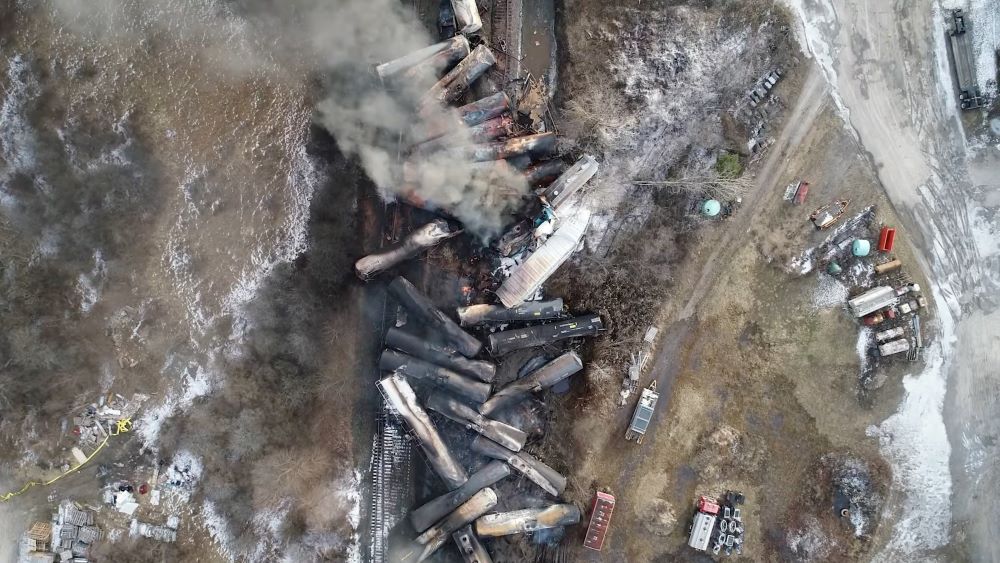
Drone footage taken Feb. 6, 2023, shows the freight train derailment in East Palestine, Ohio, that spilled toxic chemicals when 50 train cars derailed near the Pennsylvania border. (OSV/NTSB Gov handout via Reuters)
Lawyers told EarthBeat that Chevron's death underscores the need for environmental law reform and heightens alarm about how a second Trump administration would further shape the federal judiciary.
Robert Verchick, the Gauthier-St. Martin chair in environmental law at Loyola University New Orleans, said Trump appointees are not just conservative. "They really have an anti-environmental tilt," he said.
A doctrine's demise
Forty years ago, the Chevron doctrine was born in a Supreme Court ruling at the time hailed by conservatives and viewed as a loss for environmental groups.
Chevron U.S.A. v. Natural Resources Defense Council considered the ability of the EPA, then under the Reagan administration, to interpret a portion of the Clean Air Act.
The court ruled in favor of the agency's narrow interpretation, allowing manufacturing plants to modify or install a piece of equipment without a federal permit. It also directed judges to give deference to an agency's "reasonable" interpretation of a law when a statute, such as the Clean Air Act, was unclear.
"Judges are not experts in the field," wrote Justice John Paul Stevens in the opinion, and they should not impose their "personal policy preferences."
Under the Clean Air Act, the law stipulates air quality standards must be regulated with "an adequate margin of safety," but Verchick, who worked at the EPA from 2009 to 2010, said that "doesn't really tell you very much as a regulator about how much smog that allows."
He gave the example of a federal agency, which has a science advisory board and other experts, seeking to establish a permissible level of ozone — a chemical that contributes to smog — in order to protect public health.
If the statute uses expansive language and if the interpretation was reasonable, "then the court was supposed to side with the agency," he said.
Chevron tended to tip the scale in favor of the current administration. Under Republicans, Chevron often was a tool to deregulate; Democratic presidents relied on it to enforce stricter industry oversight.
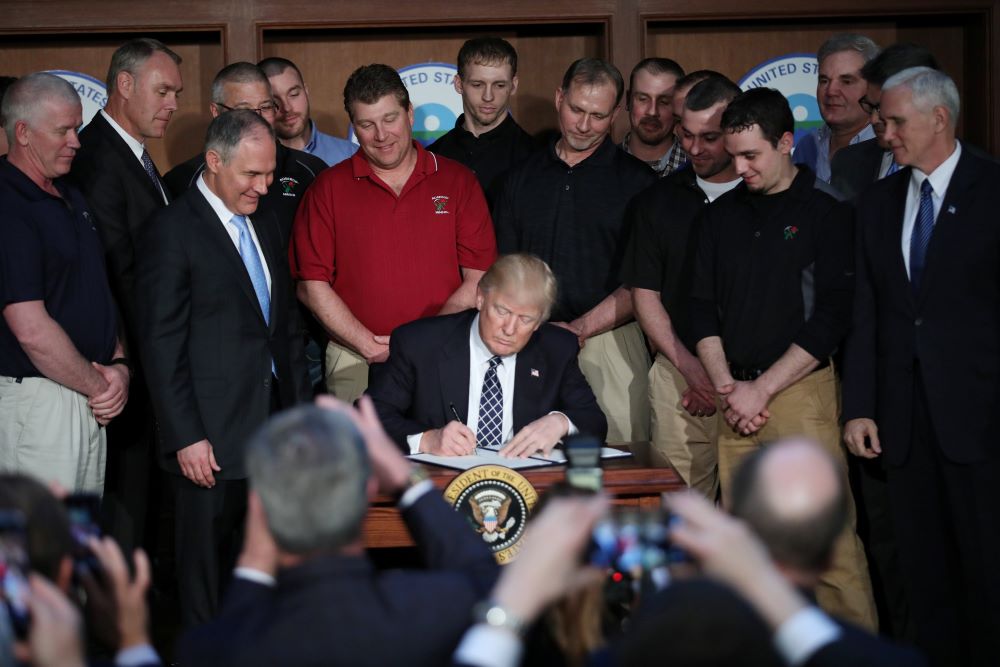
Then-U.S. President Donald Trump signs an executive order titled "Energy Independence" during a March 28, 2017, event at the Environmental Protection Agency headquarters in Washington. The order eliminated Obama-era climate change regulations and called for a review of Barack Obama's Clean Power Plan. (CNS/Reuters/Carlos Barria)
Eventually, the Chevron deference fell out of favor with conservatives, who expressed concerns over "administrative overreach" in issuing regulations and were wary of the power it gave unelected government employees. Christian groups contended Chevron was wielded to impose policies related to abortion and LGBTQ rights.
Two U.S. Catholic bishops, while not naming Chevron, wrote an editorial just days after the Loper Bright ruling, decrying federal agencies for "working methodically to promote gender ideology at the expense of the rights of people of faith."
Some of Chevron's critics used the legal battles of the Little Sisters of the Poor, who have long resisted compliance with contraception-coverage requirements promulgated by government agencies, as evidence of the doctrine's threat to religious liberty.
On behalf of the sisters, the Becket Fund for Religious Liberty filed a brief in support of the plaintiffs in Loper Bright, saying they hoped the decision would ensure agencies no longer use their powers "to run roughshod over religious believers."
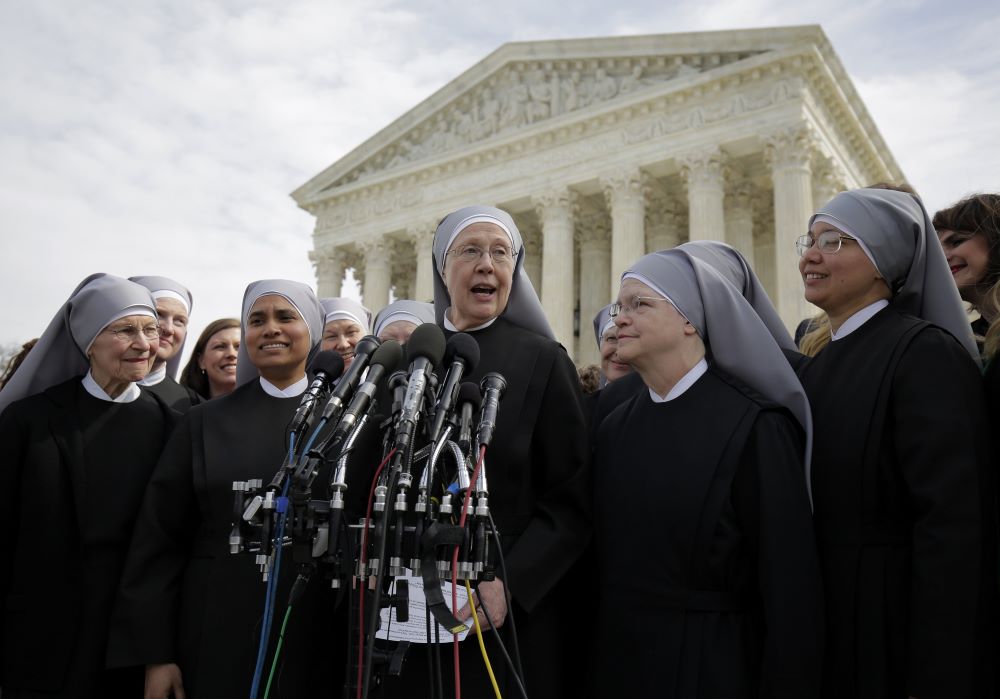
Sr. Loraine Marie Maguire, mother provincial of the Denver-based Little Sisters of the Poor, speaks to the media outside the U.S. Supreme Court in Washington in a 2016 file photo. The Chevron deference cited the doctrine's threat to religious liberty. (CNS/Reuters/Joshua Roberts)
A ruling backed by billionaires
Today, John Eastman is perhaps most well known as the former Trump lawyer who shouted false claims of election fraud at the Jan. 6, 2021, rally that preceded the U.S. Capitol riot. His efforts to keep the former president in power following his 2020 election loss resulted in Eastman facing charges for conspiracy, fraud and forgery. He has pleaded not guilty to all the counts. Eastman also faces disbarment in California and the District of Columbia, and his law license is suspended in both places.
But several years prior, the lifelong Catholic became an important partner in the steady conservative push to overturn Chevron.
Eastman — who received a "distinguished alumni" award in 2018 from the University of Dallas, a small Catholic school in Irving, Texas — questioned the authority of the so-called administrative state and viewed federal environmental laws as especially problematic, according to a Mother Jones profile on Eastman.
Filing hundreds of legal briefs, including those repudiating Chevron, Eastman co-wrote one for a 2023 Supreme Court case that left more than half the nation's wetlands without federal protection.
He also co-authored a brief against Chevron for Loper Bright Enterprises v. Raimondo.
"Interpretation of legal texts is a job for the courts," not federal agencies, Eastman co-wrote in the brief.
"The court should end the Chevron experiment," it said.
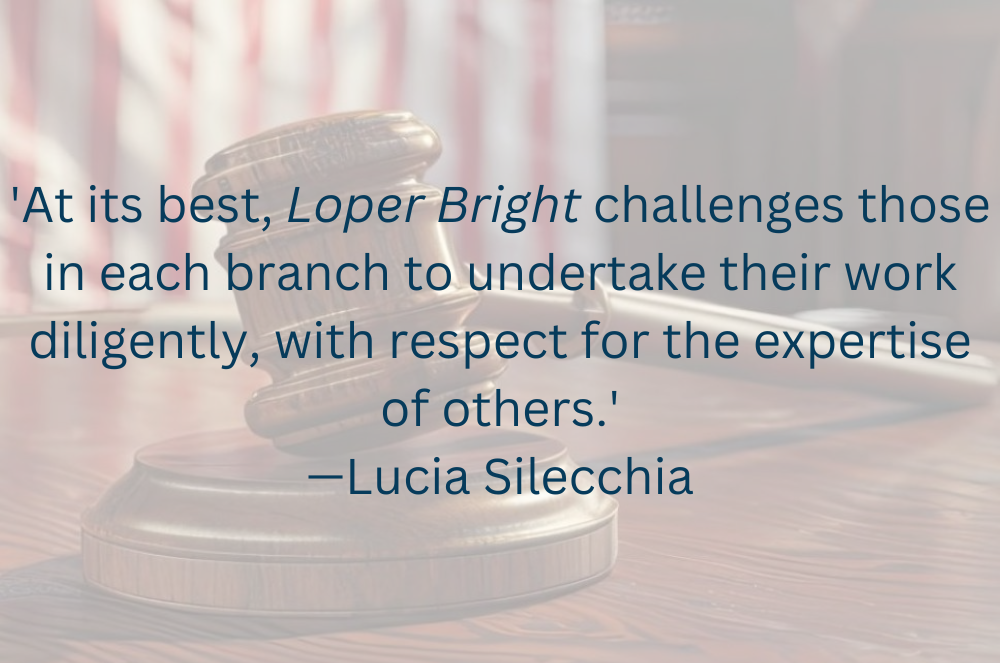
The Supreme Court consolidated Loper Bright Enterprises v. Raimondo and Relentless Inc. v. Department of Commerce, both cases brought by commercial fishing groups challenging the National Marine Fisheries Service's interpretation of a law that required herring fishermen to pay for federal monitors on their boats. The fishermen also asked the court to consider whether it should overturn or clarify Chevron.
Chief Justice John Roberts, who is Catholic, wrote in the majority opinion that Chevron is inconsistent with the Administrative Procedure Act, a federal law enacted in the 1940s that mandates courts exercise independent judgment when reviewing agency actions. Roberts said the ruling did not require previously decided cases that relied on Chevron to be overturned.
The Loper Bright decision split 6-2 along ideological lines, with the conservative justices — five of them Catholic and three appointed by Trump — in the majority.
Justice Elena Kagan, in a blistering dissent, said the court defended its decision by saying the Administrative Procedure Act suddenly requires it to give itself "exclusive power over every open issue — no matter how expertise-driven or policy-laden."
"The Act makes no such demand," she wrote. The ruling "puts courts at the apex of the administrative process as to every conceivable subject."
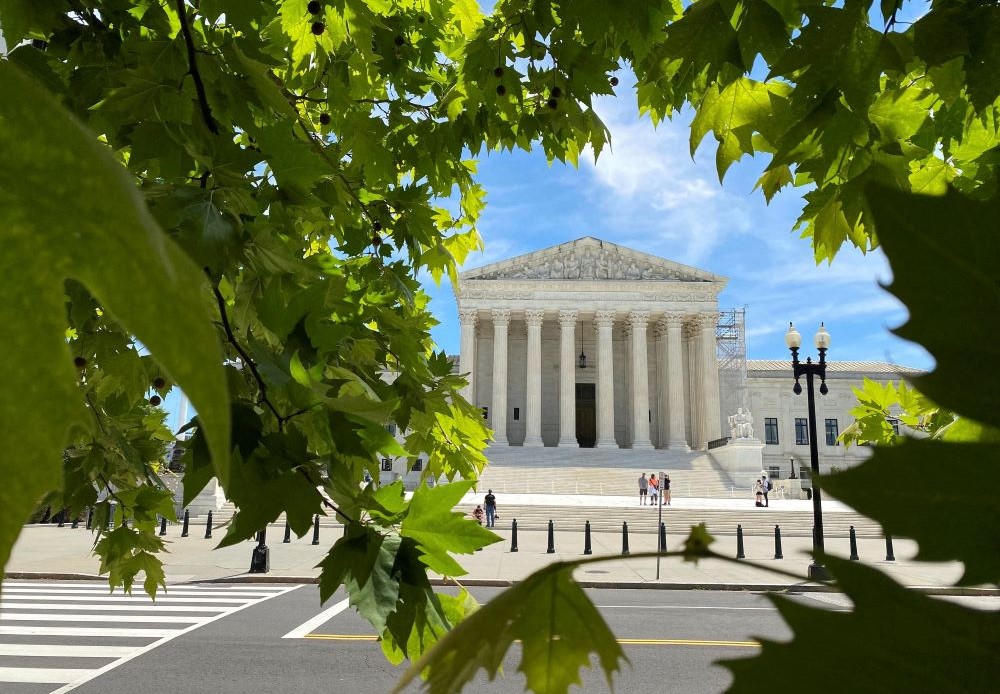
Leaves frame the U.S. Supreme Court building in Washington. The high court on Feb. 25, 2025, threw out the murder conviction and death penalty for Richard Glossip, an Oklahoma man who has been on death row for more than 25 years. (OSV News/Reuters/Will Dunham)
Last year, the New England Fishermen's Stewardship Association, an industry group, was formed in part to oppose the regulation at the center of the court's decision. The association filed a brief in support of the plaintiffs in Relentless v. Department of Commerce.
Tax filings highlighted by the liberal watchdog organization Accountable.US show the fishermen's association received a $573,000 donation around the time it was created from the Concord Fund — part of Catholic and conservative activist Lenoard Leo's dark money groups. (The CEO of the fisherman group said the funds from Concord predated the request that the Supreme Court take the Relentless case.)
Co-chairman of the Federalist Society and engineer of the Supreme Court's current conservative supermajority, Leo also has ties to the 85 Fund, a nonprofit that gave $1 million in 2020 to the New Civil Liberties Alliance, a group representing the plaintiffs in Relentless.
Katherine Stewart, author of The Power Worshippers: Inside the Dangerous Rise of Religious Nationalism, said in an interview that while opposition from the right's think tank crowd has significant and wide-ranging ideological motivations, the biggest driver of the anti-Chevron movement "is most certainly the money that comes from individuals opposed to environmental, business and climate regulation."
Petrochemicals billionaire Charles Koch, a Leo collaborator who's been dubbed a "closet Catholic" and has given millions to Catholic causes, also supported efforts to overturn Chevron. His network has financially backed both the New Civil Liberties Alliance and Cause of Action Institute, the latter representing the fishermen in Loper.
Koch and Leo are part of a billionaire class in the U.S., said Steven Millies, director of the Bernardin Center at Chicago's Catholic Theological Union. "And the increase of their wealth depends on capital gains derived from shares in publicly traded corporations."
"What I think we see in the joint activity of Leo, Eastman and Koch," Millies said, "is something like a political Venn diagram where the motive of pure profit for its own sake, ideological commitments to unregulated capitalism, and a distortion of the Catholic teaching on private property overlay one another."
An uncertain regulatory future
Environmental lawyers and advocates who spoke to EarthBeat expressed diverse opinions on Chevron's exit, but most agreed the impact could be considerable, especially for federal regulations around climate change.
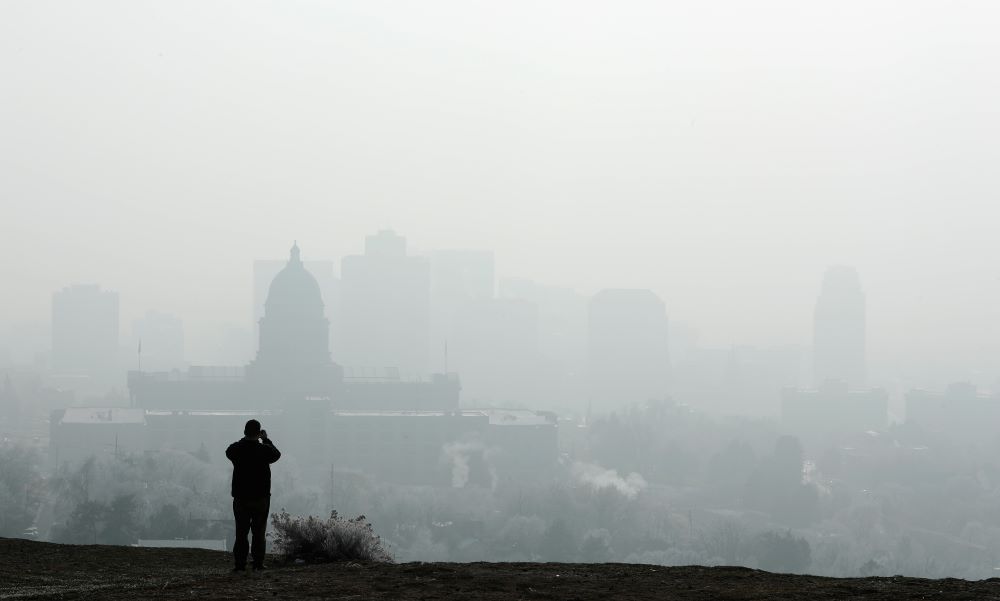
A man takes a picture of the Utah State Capitol and buildings that are shrouded in smog in downtown Salt Lake City Dec. 12, 2017. Under the Clean Air Act, the law stipulates air quality standards must be regulated with "an adequate margin of safety." (CNS/Reuters/George Frey)
To date, EPA has largely relied upon the Clean Air Act to regulate heat-trapping greenhouse gas emissions that are the primary source driving global warming. In 2007, the Supreme Court ruled the agency had authority to regulate emissions under the bedrock environmental law.
But that hasn't halted the high court's conservative majority in recent years from scaling back EPA's regulatory powers, including in a 2022 decision that limited its ability to reduce emissions.
Michael Rappaport is a professor at the University of San Diego School of Law and director of the Catholic school's Center for the Study of Constitutional Originalism.
He said environmentalists may have reason to fear that the future of climate-related regulatory actions will be constrained but contends "that's not a bug but a feature."
"Congress did not pass legislation regulating climate change, and instead, agencies used their power to impose it," said Rappaport, a contributing writer to the Federalist Society. Climate change regulations need to be authorized, he said, either by new legislation "or if fairly covered by existing legislation."
Yet Aaron Saiger, a law professor at Fordham University School of Law in New York, said when the Clean Air Act and Clean Water Act were first passed in the 1970s, "climate change wasn't on our radar."
If agencies cannot read the vagueness of the statutes to authorize the EPA to act, "then what you're saying is that the EPA cannot respond to the great environmental crisis of our moment," Saiger said.
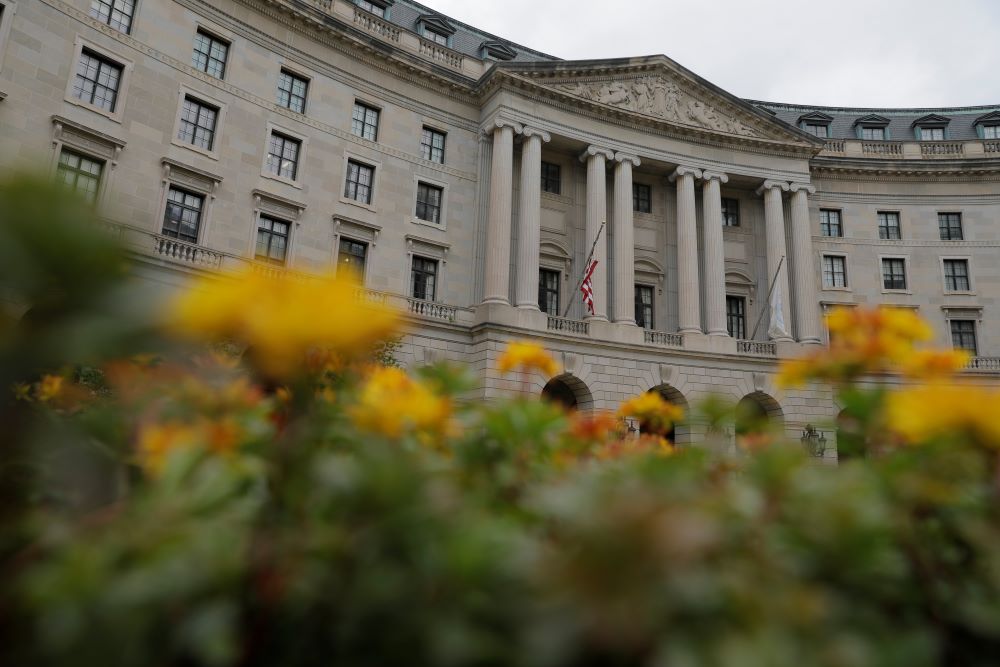
Flowers are seen in front of the headquarters of the Environmental Protection Agency in Washington May 10, 2021. The SCOTUS ruling knocking down the Chevron deference is seen as likely to be used to loosen environmental regulations. (CNS/Reuters/Andrew Kelly)
Agencies have been relying on the premise that Congress wants them to solve environmental problems, even if they didn't anticipate all the serious issues that we're now facing, said Santa Clara University's Yang, "so they've been trying to make do with a set of old statutes."
Emission rates worldwide are on pace to increase average global temperatures beyond 1.5 degrees Celsius (2.7 degrees Fahrenheit) — a level scientists say will cause more dangerous wildfires, heat waves and other disasters — in less than a decade. More than a third of biodiversity in the United States is at risk.
Like Rappaport, Lucia Silecchia, an associate dean and expert in environmental law at Catholic University of America's Columbus School of Law, said she views the Loper Bright decision as having a potentially positive impact in that it will "refocus the burdens of clear drafting, explicit delegation and decision-making on Congress."
"At its best, Loper Bright challenges those in each branch to undertake their work diligently, with respect for the expertise of others," she said, though whether and not that will occur "remains to be seen."
President Richard Nixon established the EPA in 1970, and during the following two decades Congress passed foundational environmental legislation. But other than updating the Toxic Substances Control Act in 2016, there have been no major modifications of American environmental law since the 1990s, Yang said, "when environmental issues started becoming much, much more partisan."
"Congress could solve the EPA problems if it wrote environmental laws that explicitly gave the EPA power to regulate, especially for climate," said Saiger. “The odds of that happening seem low in our current political configuration."
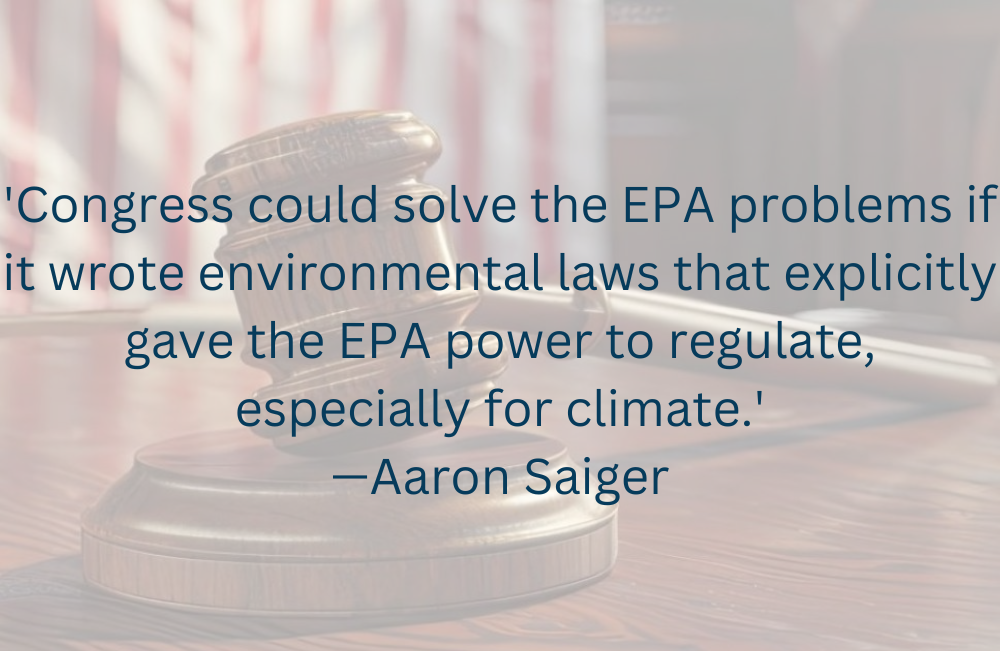
Even if Congress passed new laws, it cannot legislate every detail, said legal experts.
"Congress knows you can't micromanage every tiny thing, and they cannot anticipate everything," such as new scientific information or technologies, Verchick said.
Another problem, said Yang, echoing the dissent, is the idea that judges "can make interpretations without knowing or understanding the underlying substances. I think it's naive."
Verchick noted that Justice Neil Gorsuch recently mixed up the pollutant nitrogen dioxide with nitrous oxide, the laughing gas. The error, later corrected, was in a Supreme Court opinion temporarily blocking an EPA policy requiring upwind states to reduce air pollution that travels downwind.
How judges will read ambiguous statutes as well as rule on important environmental cases could be shaped in a consequential way under a second Trump administration, said Verchick, who called the former president's past judicial picks "ideologues and very partisan."
On Aug. 22, a Trump-appointed federal judge ruled the EPA cannot use the federal civil rights law to control how the state of Louisiana regulates facilities that pollute. Many plants are near Latino and Black communities who have experienced increased rates of cancer and other health issues.
"It was a very surprising rule based only on the law," Verchick said. "It's not surprising based on the politics of the courts."
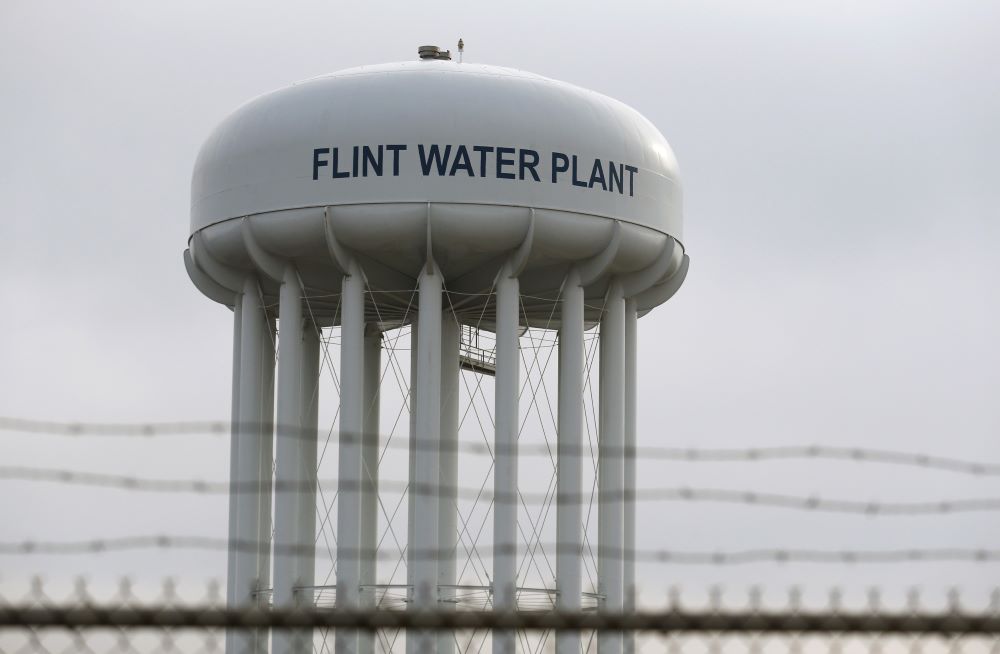
The top of the Flint Water Plant tower is seen in early February 2016 in Michigan. Flint's municipal drinking water was contaminated with lead in 2014, creating a public health crisis. (CNS/Reuters/Rebecca Cook)
Dan Misleh, founder and executive director of Catholic Climate Covenant, said if the government cannot regulate pollutants that are coming out of such plants, "more and more people suffer — children in the womb, young children, pregnant mothers and low-income people."
"We have to think through what's best for everybody, not just for the bottom lines of corporations," he said.
Dan Misleh is the founder and executive director of the Catholic Climate Covenant, (OSV News/Courtesy of Dan Misleh)
Though Trump solidified a conservative majority on the Supreme Court, Silecchia pointed out there remain more federal judges appointed by Democrat than Republican presidents.
"It is also often — but not always — the case that judges' opinions shift when they are on the court," Silecchia said. "I think it will take several years to see how the cases are trending as they wind their way through the lower courts."
Trump named 234 judicial nominees during his time in office and flipped a number of key seats previously held by liberal or moderate judges on the Supreme Court and appellate courts to those of staunch conservatives. He's pledged to further transform the federal judiciary in a second term.
As Chevron falls, another legal doctrine has gained momentum, one that lawyers who spoke to EarthBeat worry will further pare back the government's ability to address environmental problems.
In the 2022 case that curtailed EPA's emissions regulatory powers, the Supreme Court's conservative majority cited what it called the "major questions doctrine," which stipulates that regulations bearing major political or economic impacts must have clear authorization from Congress.
That new doctrine is "explicitly anti-regulatory," Verchick said.
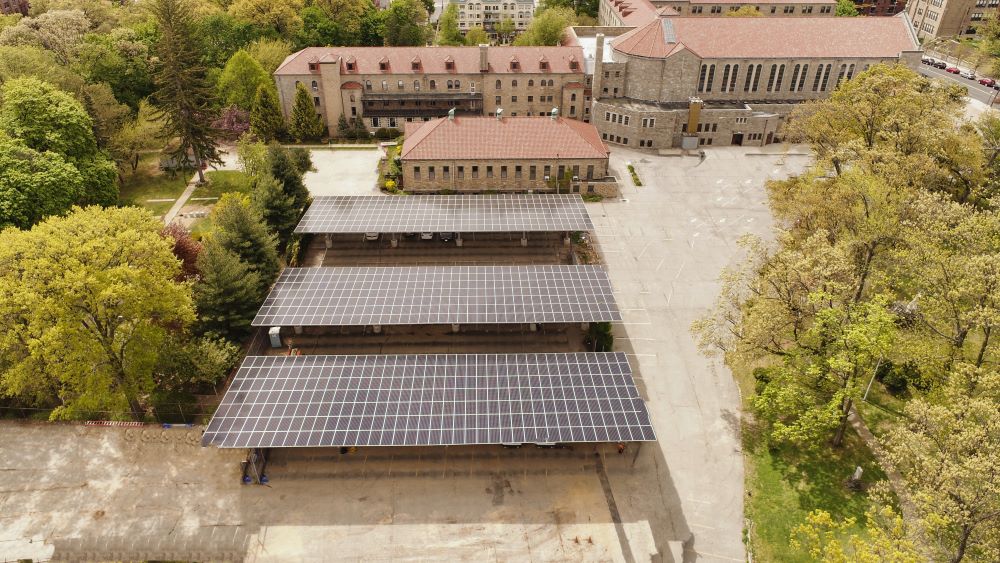
An aerial view taken in 2023 shows solar panels installed by Mission Energy at the Passionists' provincial office at Immaculate Conception Monastery in the New York borough of Queens. Mission Energy manages the Catholic Energies program, an initiative of the Washington-based Catholic Climate Covenant, which helps Catholic facility owners start solar energy projects. (OSV News/Courtesy of Mission Energy)
'Contrary to the spirit of Catholic social teaching'
Legal experts told EarthBeat the end of the Chevron doctrine could hinder agendas for Democrats or Republicans. But regardless of who's in the White House, the Loper Bright ruling will embolden companies to challenge existing laws in court.
Indeed, legal challenges to EPA regulations quickly attempted to bolster arguments with Loper.
Less than three weeks after Chevron was nixed, opponents to a new mercury rule for coal-fired power plants argued in a filing that EPA can no longer be given "deference" on two points in the emission standards.
Catholic Climate Covenant said it will be watching in coming months for any rollbacks to EPA rules issued under the Biden administration, particularly how they impact low-income and rural communities.
"The purpose of the government is to promote and protect the common good, and if the implementation of some of these rules get delayed or reversed, that can have a tremendous impact on human health and the environment," Misleh said.
Advertisement
Christopher Bacon, an environmental social scientist and associate professor at Santa Clara University, said he understands some of the Supreme Court's concerns about the separation of powers. In practice, though, he said there are multiple ways to check the power of agencies, including through congressional oversight, lawsuits and new legislation.
Co-chair of the Laudato Si' Commision for the Association of Jesuit Colleges and Universities, Bacon said that Catholic teaching "asks us to apply faith and reason to work for the dignity of human life, the common good, justice and care for creation."
The end of Chevron threatens people and the earth's health, he said, and it "strikes me as contrary to the spirit of Catholic social teaching."






